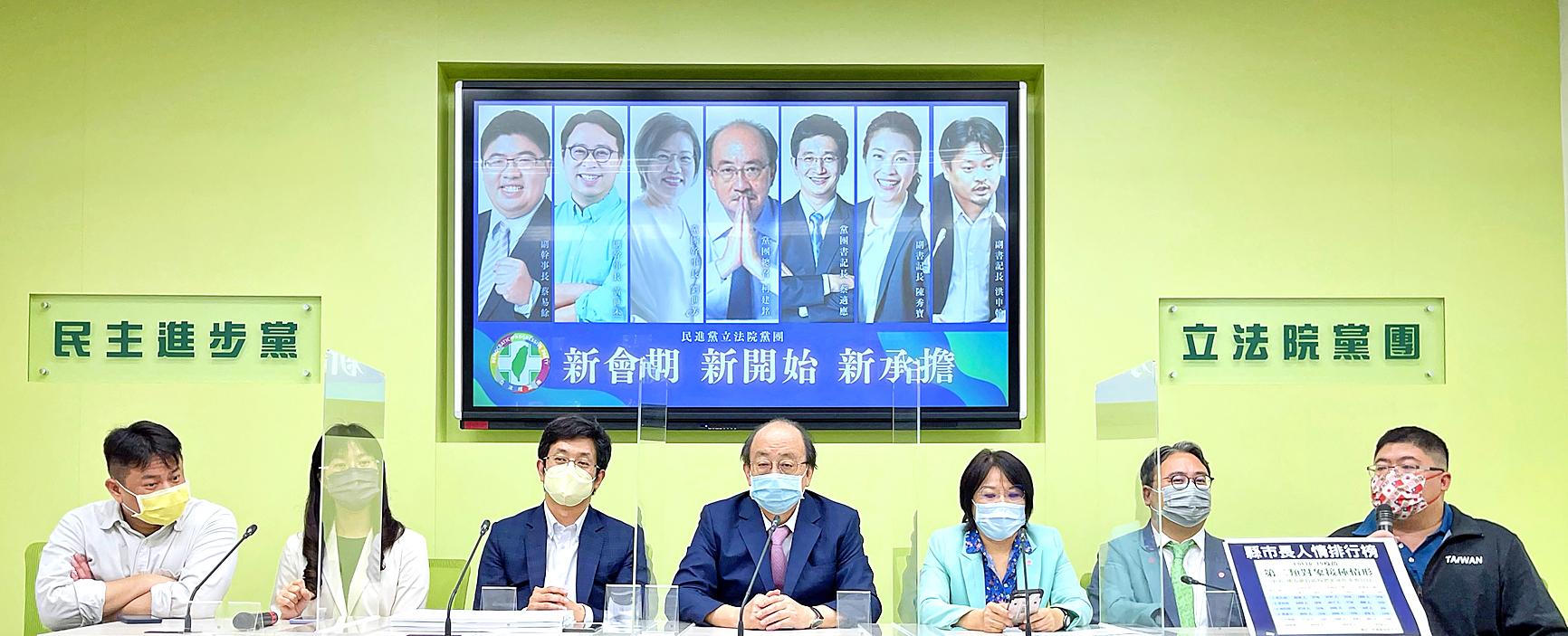The new legislative session, which started yesterday, symbolizes a new beginning and new challenges for the Legislative Yuan, Democratic Progressive Party (DPP) caucus whip Ker Chien-ming (柯建銘) said.
Lawmakers’ plates would be full with five major budgets to review, including the fiscal 2022 budget, the state-owned businesses budgets for fiscal 2021 and fiscal 2022, the budget for the Quintuple Stimulus Voucher program and the special military purchase budget, Ker said.
The DPP has convened its own Constitution Amendment Committee to begin discussing amendments to the Constitution once the party’s’ Central Executive Committee approves a draft amendment, Ker said.

Photo: CNA
All political parties should be aware that the timing for the legislature’s approval of such an amendment is critical to whether the amendment can be voted on along with next year’s general elections, Ker said.
He was referring to the Article 12 of the Constitution, which states that a mandatory referendum must be held should the Legislative Yuan pass a motion to amend the Constitution.
However, per the Referendum Act (公民投票法), all referendums must be held on the fourth Saturday in August and can only be held every two years.
In October last year, an ad hoc 39-member Constitutional Amendment Committee that is to consider revisions to the Constitution was inaugurated at the Legislative Yuan in Taipei, after the list of members was approved.
Any proposed constitutional amendments would have to receive the backing of at least one-quarter of the nation’s 113 lawmakers to be forwarded to the legislature’s Procedure Committee, which would then assign them to the Constitutional Amendment Committee for review.
For a proposal to be approved, it must be backed by at least half of the members of the Constitutional Amendment Committee present at a meeting that is attended by at least one-third of the members.
Should a proposal be passed by the committee, it would then have to be approved by at least three-quarters of the lawmakers at a meeting of the legislature attended by at least three-quarters of all lawmakers.
Should that threshold be met, the proposal would be put to a public referendum.
Meanwhile, Ker said that the new session would prioritize legislation that was unresolved after the last session.
It would then deal with urgent legislation already delivered to the legislature, such as the bill to reform the Taiwan Railway Administration, Ker said, adding that drafts that are still being mulled over by the Executive Yuan would be delt with last.
Ker urged change in the legislature culture, calling on legislators across party lines to come together and serve their country together.
Separately yesterday, Chinese Nationalist Party (KMT) Chairman Johnny Chiang (江啟臣) said that the new session is a “wartime session” for the party.
As the largest opposition party, the KMT would do its best to provide budgetary and legislative oversight over the government, said Chiang, who is also a lawmaker.
Chiang called on the government to ensure that it does not become entangled in regional conflict — either politically or militarily — or competition with larger states.
The KMT would be reviewing the defense budget carefully, as defense spending increases every year, without apparent gains, he said.
Additional reporting by CNA

Costa Rica sent a group of intelligence officials to Taiwan for a short-term training program, the first time the Central American country has done so since the countries ended official diplomatic relations in 2007, a Costa Rican media outlet reported last week. Five officials from the Costa Rican Directorate of Intelligence and Security last month spent 23 days in Taipei undergoing a series of training sessions focused on national security, La Nacion reported on Friday, quoting unnamed sources. The Costa Rican government has not confirmed the report. The Chinese embassy in Costa Rica protested the news, saying in a statement issued the same

Taiwan’s Liu Ming-i, right, who also goes by the name Ray Liu, poses with a Chinese Taipei flag after winning the gold medal in the men’s physique 170cm competition at the International Fitness and Bodybuilding Federation Asian Championship in Ajman, United Arab Emirates, yesterday.

A year-long renovation of Taipei’s Bangka Park (艋舺公園) began yesterday, as city workers fenced off the site and cleared out belongings left by homeless residents who had been living there. Despite protests from displaced residents, a city official defended the government’s relocation efforts, saying transitional housing has been offered. The renovation of the park in Taipei’s Wanhua District (萬華), near Longshan Temple (龍山寺), began at 9am yesterday, as about 20 homeless people packed their belongings and left after being asked to move by city personnel. Among them was a 90-year-old woman surnamed Wang (王), who last week said that she had no plans

TO BE APPEALED: The environment ministry said coal reduction goals had to be reached within two months, which was against the principle of legitimate expectation The Taipei High Administrative Court on Thursday ruled in favor of the Taichung Environmental Protection Bureau in its administrative litigation against the Ministry of Environment for the rescission of a NT$18 million fine (US$609,570) imposed by the bureau on the Taichung Power Plant in 2019 for alleged excess coal power generation. The bureau in November 2019 revised what it said was a “slip of the pen” in the text of the operating permit granted to the plant — which is run by Taiwan Power Co (Taipower) — in October 2017. The permit originally read: “reduce coal use by 40 percent from Jan.